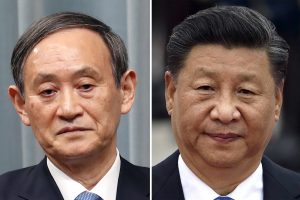On September 25, Japanese Prime Minister Suga Yoshihide, who has recently taken over from his predecessor, Abe Shinzo, held a telephone conference with Chinese President Xi Jinping. Japanese media reports have focused on the fact that the meeting did not touch on Xi’s state visit to Japan. This visit, postponed due to the COVID-19 outbreak, is of great diplomatic significance to Japan in light of the international situation, and specifically the U.S.–China dispute, and so it is an important issue to the new Suga administration as well.
The content of what was discussed has naturally been presented in different ways in China and in Japan. The Japanese Ministry of Foreign Affairs was slightly more concise in its coverage. It is clear that neither Japan nor China made any reference to Xi’s Japan visit. If we combine the announcement issued by the Japanese Ministry of Foreign Affairs, reporting in Japanese media, and the announcement of the Chinese Ministry of Foreign Affairs, then the details of the meeting that have been made public are as follows.
First, Xi expressed his hope that Japan and China would enjoy a cooperative partnership and that the new Japanese government would build a Japan–China relationship that is compatible with the new era, based on the principles and spirit of the four basic documents between Japan and China as well as the assumption that there is a willingness to deal with historical and other sensitive issues. “Cooperative partnership” is a term that has been used mainly in connection with trade and the economy since 2018, when the trend of better relations between Japan and China became more pronounced.
Second, the Chinese president said that Japan and China had overcome the COVID-19 pandemic by working together and stated that the potential of the Japan–China economic partnership was demonstrated by the fact that it had expanded during the pandemic. Moreover, bearing in mind that China is pursuing a new model for economic development built on a reciprocal relationship between the domestic and international economies, Xi stated that China will maintain both stable industrial supply chains and a fair and open environment for trade and investment, while enhancing the volume and level of cooperation. This could be said to reveal the Chinese desire to keep Japan’s supply chains from becoming too U.S.-centric and, more specifically, Beijing’s wariness of the Ministry of Economy, Trade, and Industry (METI) assisting in the ongoing withdrawal of Japanese companies from China. Xi also signaled that China would lend its support for a successful holding of the 2021 Olympic Games in Japan.
Third, Xi asserted that both Japan and China have a great responsibility for the world’s peaceful and stable economic development, and that the two countries should actively develop multilateralism and maintain the international order and international system, centered on the United Nations, based on the principle of a community with a shared future for humanity. Based on these ideas, the Chinese leaders also called for Japan–China cooperation to advance with respect to global issues. This part of the conversation is described very differently in Japan and in China. The Chinese side claims that Japan accepts the idea of a community with a shared future for humanity—the ultimate goal of China’s “new international relationships”—and supports the Chinese-backed, UN-centered “international order” that China distinguishes from the U.S.-centered “world order.” This does not appear in the Japanese record. It is unknown whether this was added by the Chinese after the meeting or whether it was just something Xi said without actually eliciting a response from Suga.
Suga appears to have spoken about maintaining a close relationship with Xi and moving forward with signing the Regional Comprehensive Partnership Agreement before the end of the year as well as negotiating a Japan–China–Republic of Korea FTA, yet these points are also missing from the Japanese record. Meanwhile, although the Japanese said that the two leaders spoke about “Japan and China’s continued cooperation in handling North Korea, including the kidnapping issue,” this is not included in the Chinese public record.
And so while the first Japan–China telephone conference since the creation of the Suga administration was mainly an “exchange of greetings,” it also appears that both sides were quite straightforward in the way in which they expressed themselves. However, I would argue that the importance of this exchange lies elsewhere: the fact that the telephone conference between Suga and Xi was requested by the Japanese. This would suggest that the Chinese are acknowledging the trend toward “better relations” that has existed between Japan and China. Japan–China relations are said to be improving, but one turning point for China’s position was a telephone conference between Xi and Abe in early May, 2018. Before then, telephone conferences were normally conducted only at the premier level, but the fact that this was done on the presidential level was likely a Chinese signal of improving Japan–China relations. What the recent call indicates is that this position has carried over to the Suga administration.
Of course, Chinese government vessels have been very active around the disputed Senkaku Islands (known in China as the Diaoyu Islands) and the relationship remains tense in the security realm. Nonetheless, the fact remains that Japan still has a channel of communication with China despite the U.S.–China tensions. How will it use this channel? The Suga administration’s answer to that question will be worth watching.
Shin Kawashima is a professor at the University of Tokyo.

































